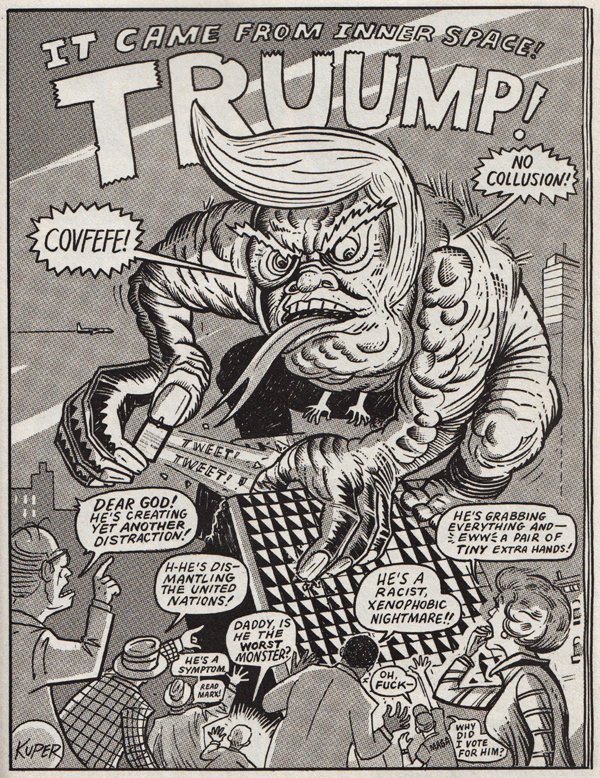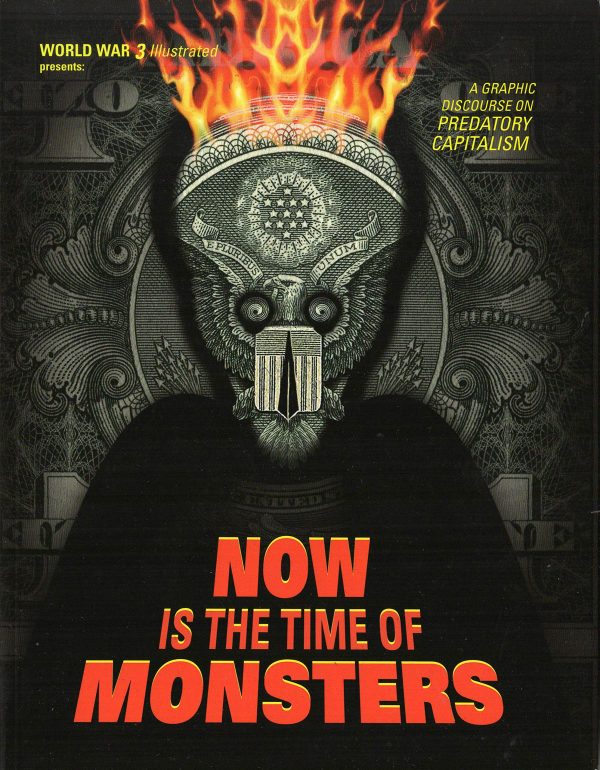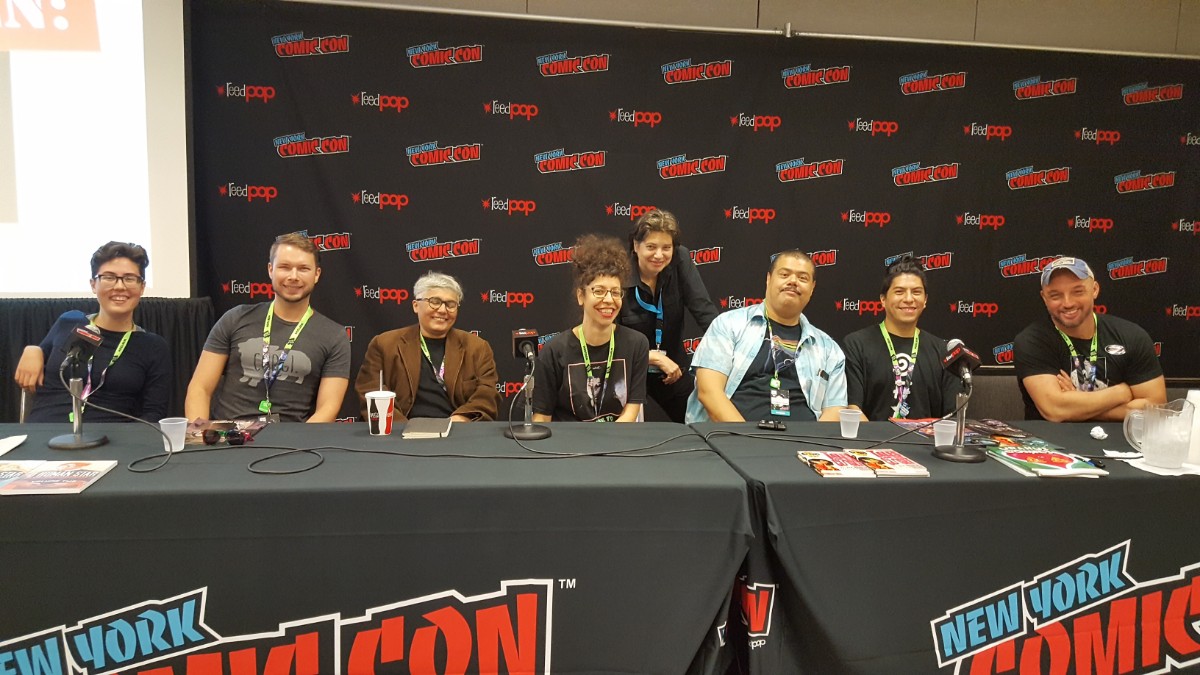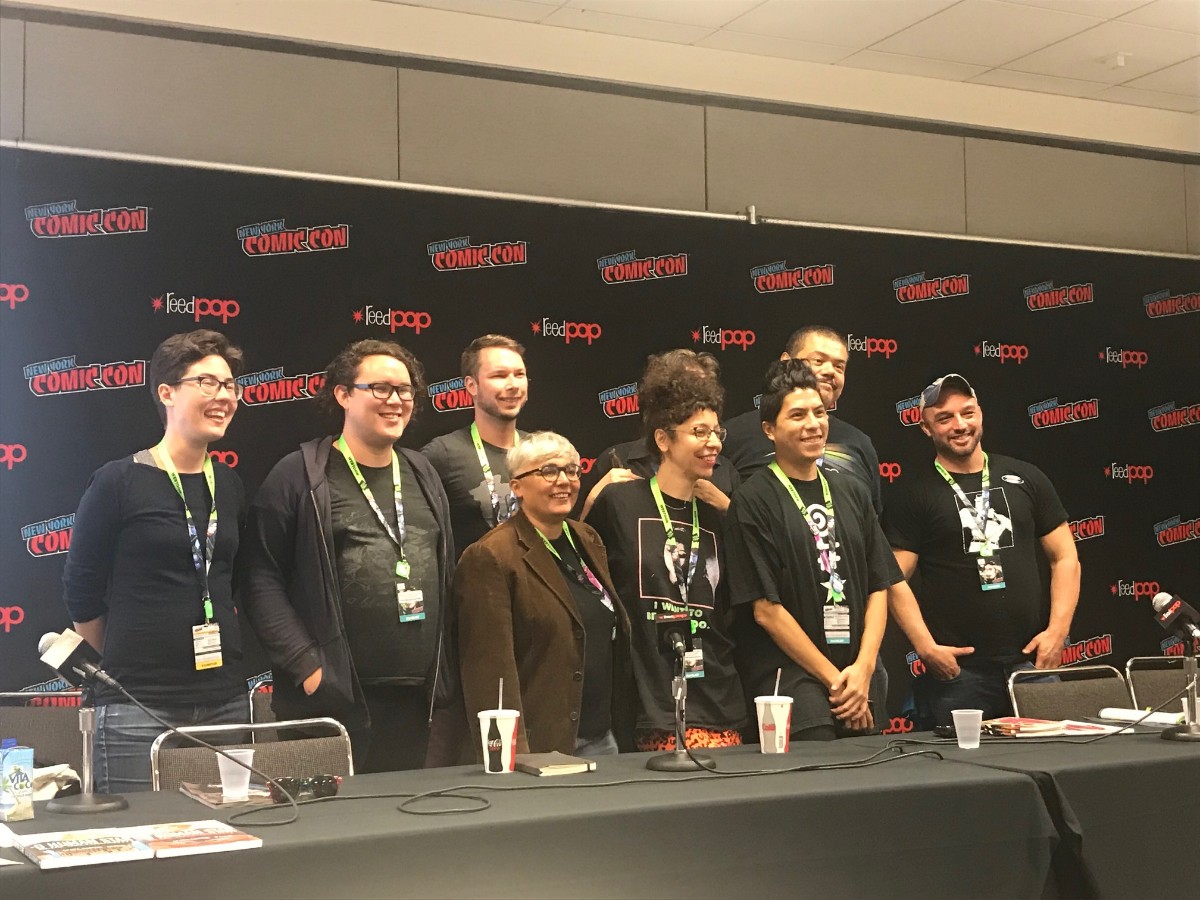The radical comics anthology magazine World War 3 Illustrated offers this book collection of stories, its 49th issue, Now Is the Time of Monsters from AK Press, that focus on different aspects of predatory capitalism. It’s everything you’d imagine from a scrappy gathering of progressive and radical political cartoonists, ranging from passionate information dumps to personal testimonies about the cartoonist’s own experience navigating our capitalist wasteland.
The book opens with a history of post World War 2 labor, including unions and strikes, but also the government’s culpability in the loss of jobs to overseas locations and the low standards American workers are employed under. It’s as thorough as possible and passionate, but the collection is best when a larger point about working and struggling, but also race, disability, and other topics concerning capitalism, is made with a personal story.
This is best achieved using a historical tale with Kevin Pyle’s “The Giant and the Hunter.” Pyle tells about the life of 18th-century Irish giant Charles Burns and its intersection with the grave robbers known the Resurrectionists and uses these as an intro to the modern problem of body brokers, who prey on bereaved poor people, as a grim manifestation of the capitalist exploitation of the dead

But Sandy Jimenez‘s “Skin Poisoning” is the gold standard – so to speak – of wrapping larger issues into personal stories. It’s an intense, electric recounting of the cartoonist’s time on a grueling demolition job in New Jersey, where he and his teammates shared barracks. Amongst the crew is a bully named Victor, a black man who antagonizes Jimenez and also challenges him to do more than just battle. Victor is a challenge to achieve understanding, and Jimenez uses this reminiscence as both an affecting character study and a way to present concepts of race within a personal narrative.
Other favorite entries of mine include: Steve Wishnia and Marc McGill’s nightmarish testimony of a NYC cabbie trying to make ends meet; Tom Kaczynski’s “36th Chamber of Commerce,” in which freelancing is portrayed as a dystopian nightmare sold as pure freedom; J. Gonzalez’s “100 Reasons Why,” a sprawling and honest memoir of trying to survive with a disability, attempting to keep work in order to stay afloat; Sue Coe’s “She Was Just Following Orders,” which is in a category by itself, a traumatic indictment filled with nightmare imager pointed of Gina Haspe and the culture of disassociating itself from atrocities in the name of the law and the government; and Peter Kuper’s “Trump,” which recasts our national nightmare as a series of stories in old Marvel horror comics from the 1960s.
But there are tons more packed in there, and it’s admirable how much information is crammed into the book’s 176 pages, including Erik Thurman‘s expose on the situation in Puerto Rico, Carlo Quispe‘s recounting of the story of Peruvian president Alberto Fujimori, and a report on ICE activity in Detroit by Jeffrey Wilson and Armin Ozdic.
The thing with comics like these is that they are only likely to attract the people who are already in line with the messages contained. You already know if you’re going to like a book like this or hate a book like this. That’s a problem because being informational is the number one point of many of these contributions and the challenge is to get into the hands of people who don’t even know about it. Whether it’s an appeal through intellect, history, or personal memoir, the creators here want to pass along something more substantial, and in doing so, they want to make a difference to change what they are addressing.

But that doesn’t mean such books shouldn’t exist. My advice to people who want this information passed on is to buy an extra copy and find a worthy place to donate it, preferably a local place aimed at teenagers, to make it available to someone who might not otherwise encounter it.
Think of it like a Jack Chick tract. Remember that viral information is not confined to the internet. Back in the day, we used to call it “word of mouth,” and it’s still the most effective way to get messages across. People embrace not only what they see, but what they hear, what they taste, smell, breath, and even what hurts them. People also welcome proof that they can affect things and evidence that they aren’t alone. I’m pretty convinced that’s the kind of effect a book Now Is the Time of Monsters could have if well placed.
In other words, the most vital concern with this book isn’t reading it for yourself. It’s figuring out who to lend your copy to.








Awesome!
It hilarious to see something like this coming out at the exact same moment socialism has transformed Venezuela into a near-Mad-Maxian hellscape.
https://www.theguardian.com/world/2018/jul/25/venezuela-inflation-crisis-nicolas-maduro
White people problems…am I right?
Mike
Heard a public radio program at the weekend that said that Venezuela’s nationalised oil sales to various other countries in the region practically gives the oil away. Presumably because Chavez did commit to some sort of alternative bloc, and that, under Maduro’s continuation of Chavez, the country has politically been constrained to back out of those oil commitments (and the oil price is significantly less than it was anyway, to discount). Politically hard to back out of those commitments was what I heard.
As per the Guardian article, glad to hear people are resorting to a barter economy in the face of hyperinflation.
You realize there are other socialist economies out there, right? Denmark is fine, for example. And capitalist economies have been known to fail. So maybe sweeping generalizations based on cherry picked facts isn’t as smart as you think it is?
Denmark is not a Communist or socialist country. It is a capitalist country that does so well that it can afford to have socialist programs that help its majority white-christian-straight population.
The social progress that Progressives love so much cannot exist without preexisting wealth .
A poor country with a small elite living lavishly is STILL poor and would still be poor if all the elite were killed and their wealth was divided up.
i wish spoiled entitled trust fund babies who squander their access to knowledge by willfully remaining ignorant would st f u about lecturing everyone on how everything should be. Telling us a poor country can will itself into being a rich country or advocate for reparations or redistribution so they can magically become the next China or Japan , South Korea, or Wokeanda. These pompous princesses need to wake up. Reality is not a fairy tale.
Reality is not a “social construct”.
Comments are closed.